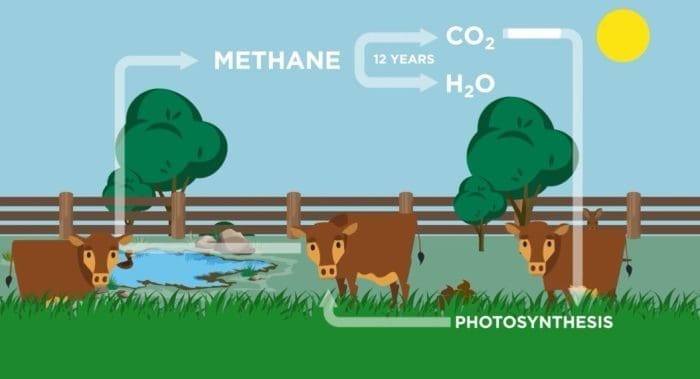DENMARK has become the latest country to make plans for taxing livestock methane emissions – with the Government making a deal with its dairy industry to implement a $144.5 (672 krone)/cow/year tax by 2030.
The plan at this stage appears to be for dairy cattle and it is unclear what beef cattle producers are going to have to pay.
It is the most specific plan, Beef Central is aware of, put in place by a Government to tax methane emissions. The plan has been welcomed by the dairy industry but some media reports are suggesting it has angered local farmers.
The Danish Government is planning to return proceeds of the tax to industry to assist with re-foresting some areas and other “green” initiatives – the package is worth 40b krone or about AU$8.6b.
“With today’s agreement, we are investing billions in the biggest restructuring of the Danish landscape in recent times,” Danish foreign minister Lars Løkke Rasmussen said.
“We create much more nature, a cleaner water environment, grow much more forest and make it possible to develop agriculture for the green competition of the future. At the same time, we will be the first country in the world with a CO2 tax on agriculture. It is another example of what we can achieve when we conduct politics across the middle.”
Other attempts to tax methane
Several other attempts to either tax methane or enforce reduction of cattle herds to reduce methane emissions have been canvassed in recent years – which have been unpopular with local livestock industries.
The Netherlands was planning to buy out thousands of farms in the name of reducing methane and nitrogen emissions, which resulted in widespread protests from farmers blocking supermarket distribution centres and clogging up cities with tractors. Politicians campaigning against the legislation have had some success in recent elections.
New Zealand’s previous Jacinda Ardern-led Government proposed to implement what became known as a burp tax for sheep and cattle which also drew widespread protests. A new Government has been elected with promises to reverse the tax.
The Irish industry is also being legislated to reduce methane emissions by 25pc, with some saying the country can do it through genetic improvement and others saying it will reduce herd sizes. The impact it has had on the electorate is unclear.


Rural Australia may not have the votes, but we pay our fair share of tax as well.
Every day people sit down and have breakfast, lunch, tea and all that food is produced by farmers/producers, maybe our government should start supporting the real people that fuel the country.
Farmer don’t get pay increases with CPI we get prices dictated to us.(Price takers not price maker).
Renewable energy gets built in rural areas to supply metropolitan areas. (No wind towers on BONDI) wouldn’t that kick up people.
Why are cattle/sheep not looked at as the ultimate renewable, they graze actively growing grass, that is sinking carbon in a cycle.
Maybe we should be taxing people for methane, more pollution over cities then rural areas.
The first thing which jumps out in this artificial green religious crusade is that as usual, as always happens, as the powerful always do, the attack is directed at the weakest link, those with the least capacity to mount a resistance. Once again, the poor old dairy industry is the target. Once the precedent is created, the beef industry is less able to mount a defence. Standard military strategy modified for industry application. Fundamentally, food production is being compromised by the Danish government, in the name of growing more trees. Billions of people, including me, agree that we should grow more trees, but not at the expense of essential industries, and particularly not in the extremely tenuous connection with the livestock methane cycle. I thought the Danes had more intelligence. (Obviously not. Apologies to Princess Mary.)
Paul Franks is on the money.
Growing pasture removes carbon from the atmosphere, cows eat it and convert carbon into product humans eat and trade. Some CO2 and methane is expelled.
Well managed animal activity has a beneficial effect on soil & plant biology.
The methane produced has a relatively short life as the carbon cycle continues.
Atmosphere to plants to cows then back to atmosphere.
Livestock do not generate any extra carbon emissions. They simply recycle what is already there.
If the vegetation is not consumed by a cow it will either be eaten by worms / termites or burn in a wildfire.
Both these actions will release appropriate levels of methane / gasses.
Cattle in grasslands are a closed loop.
We have to stop this rubbish, sack the MLA and the CN2030 BS. I want more CO2 as it aids photosynthesis in a dry climate like ours, and in geological time we are at historically low level of CO2 in the atmostphere – 400ppm is relatively low. The War on Farming is clear, and unless we realise that and seriously fight back we’ll be slowly eliminated.
Can only push up the price of protein. As long we don’t get sucked into the same fallacy game on.
A tax of $144.50 per year per cow would bankrupt a lot of farmers in Australia, especially at the current abattoir prices. Collapse the price of land, for it to be bought up by corporates who then “convince” the government to rescind the tax.
As an aside talking to the MLA representative at Beef 2024, the question was asked, cows eat grass which the carbon comes from the atmosphere as CO2, so why are cows not carbon sinks. The answer was, we cannot count that because it is part of a cycle.
What hope have we got when that is the attitude.